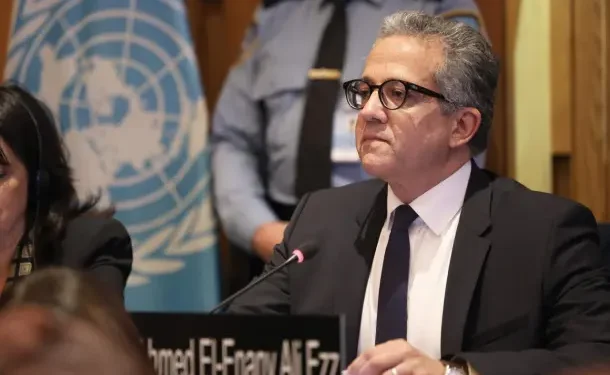The Executive Board of UNESCO has nominated Khaled El-Enany of Egypt for the position of Director-General of the United Nations Educational, Scientific and Cultural Organization (UNESCO).
The nomination follows a vote by the 58-member Executive Board and will be submitted for approval by all UNESCO Member States on November 6, during the Organization’s General Conference in Samarkand, Uzbekistan. If confirmed, El-Enany will succeed Audrey Azoulay in mid-November 2025.
Khaled Ahmed El-Enany Ali Ezz, born in 1971, is a renowned Egyptologist and Professor of Egyptology at Helwan University, where he has taught for more than 30 years. Throughout his academic career, he has held several key positions including Vice Dean of the Faculty of Tourism and Hospitality, Director of the Open Learning Center, and Head of the Tour Guide Department.
El-Enany earned his PhD in Egyptology from Paul-Valéry Montpellier 3 University in France, where he has also served as a visiting professor multiple times.
Between 2014 and 2016, he directed both the National Museum of Egyptian Civilization and the Egyptian Museum in Cairo. He went on to serve as Minister of Antiquities, and later as Minister of Tourism and Antiquities of Egypt from 2016 to 2022.
In recognition of his contributions, El-Enany was appointed Special Ambassador for Cultural Tourism by the World Tourism Organization (UNWTO) in November 2024, and recently became patron of the African World Heritage Fund. He is a member of several international scholarly societies and has received numerous international distinctions. El-Enany is fluent in Arabic, French, and English.
Founded in 1945, UNESCO works to promote peace and security through international cooperation in education, science, culture, communication, and information. The organization, headquartered in Paris, has 194 Member States, 54 field offices, and employs more than 2,300 staff worldwide. UNESCO also oversees over 2,000 World Heritage sites, Biosphere Reserves, and Global Geoparks, as well as networks of Creative and Learning Cities and 13,000 educational and research institutions.
UNESCO’s guiding principle, enshrined in its 1945 Constitution, states:
“Since wars begin in the minds of men, it is in the minds of men that the defenses of peace must be constructed.”




















